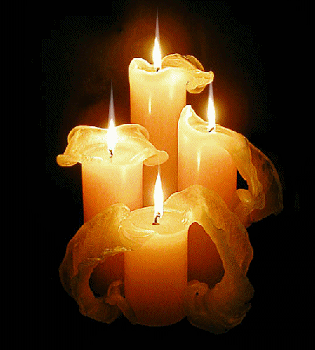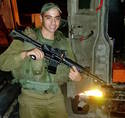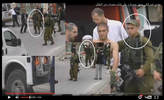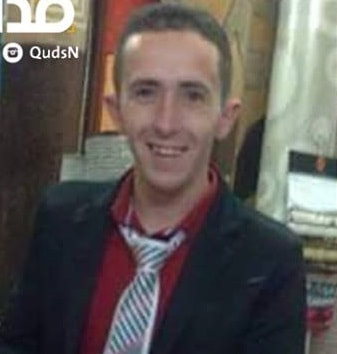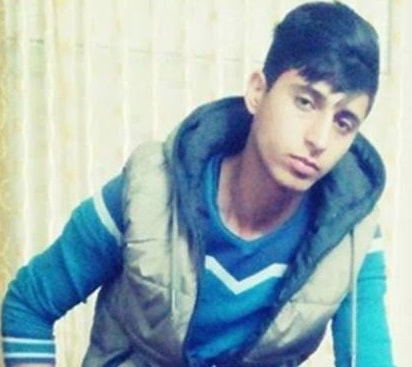25 mar 2016
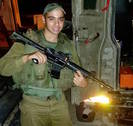
Elor Azraya, the soldier who summarily executed Abed al-Fattah Yusri al-Sharif as he lay on the street immobile and unarmed yesterday, is suspected of murder.
In his defense, his lawyer Eyal Beserglick said Azraya “acted in accordance with the rules of engagement as suggested by his superiors.”
He’s right.
It’s unclear which superiors the lawyer is referring to, but it could be any number of figures in the political and military echelon who have commanded Israeli soldiers to shoot Palestinians deemed attackers dead on-the-spot.
That’s precisely what he did. And now Israel’s top brass is hanging the killer out to dry.
Since the graphic video released by the Israeli human rights group B’Tselem went viral, Israeli Prime Minister Benjamin Netanyahu and Defense Minister Moshe Ya’alon distanced themselves from the killing, however stopping short of condemning the killer. But just a few months ago, they were inciting soldiers to kill and guaranteed them full legal backing.
Here are the statements from October translated from official videos posted to Netanyahu’s Youtube account, and statements following the execution.
Defense Minister Moshe Ya’alon
October 9, 2015: “Right now is it required to respond quickly to any local attack to eliminate the terrorist stabber or the perpetrator stone thrower and the like, immediately, on the spot.”
March 24, 2016: “Even as we are forced to fight our enemies and overcome them in battle, we are equally obligated to uphold our mores. To be human.”
Prime Minister Benjamin Netanyahu
October 14th, 2015, speaking to paramilitary border police units: “I know that it requires your discretion, but have no doubt: You have complete backing – complete! – from me, from the Israeli government, and in my opinion from the nation in Israel.”
March 24, 2016: “What happened in Hebron doesn’t represent the values of the IDF. The IDF expects its soldiers to behave level-headedly and in accordance with the rules of engagement.”
Israeli military Chief of Staff Gadi Eizenkot
October 8, 2015: “Our policy of use of force is very clear. The IDF has complete freedom of action in order to to fulfill the mission to restore security.”
March 25, 2016: Israeli army spokesperson speaking on behalf on Eizenkot: “The chief of staff views the incident with severity and has ordered a full probe. This is not the IDF, these are not the values of the IDF and these are not the values of the Jewish people.”
Other politicians who have backed the shoot-to-kill policy have been silent in the wake of yesterday’s killing.
Yair Lapid, Member of Knesset and Chairman of the “centrist” Yesh Atid Party, did not made a public statement yesterday. But in October, he encouraged vigilantes killings, telling the Israeli public, “Whoever takes out a knife or a screwdriver, or whatever it may be, the directive needs to be shoot in order to kill. Not to hesitate. There will be full legal backing. The state gives full legal backing.
”
Benti Sau, Israeli Police Acting Commissioner, has also refrained from comment. But on October 8, 2015, he said, “From my personal experience, I can tell you that at this time, we have received backing from the political level, full backing from the legal system.”
Education Minister Nafatali Bennett, Minister of Science Ofir Akunis, MK Bezalel Smotrich and MK Oren Hazan all publicly defended the soldier who executed a wounded, unarmed man.
For its part, the New York Times dutifully focused on the fact that Israel detained the soldier, conveniently omitting the aforementioned official shoot-to-kill directives.
New York Times correspondent Diaa Hadid even claimed that Israeli top brass were asking soldiers to not shoot-to-kill. I asked Hadid what statements she was referring to on Twitter, but she declined to respond. Perhaps she was referring to Israeli army chief of staff Gadi Eizenkot’s January statement that he doesn’t want Israeli soldiers and police to unload their entire magazine into 14-year-old girls with scissors (this actually happened, and the cop who did it was found to have committed no wrongdoing). If that is the case, the irony of Eizenkot’s statement appears to be lost on Hadid, as it was the Israeli right-wing who pilloried him for his statement. Eizenkot is the architect of the Dahiya Doctrine, which calls for disproportionate force to be used against civilians.
Several other important details have come to light since yesterday.
Azraya is a medic in the Kfir brigade. While the fact that someone tasked with treating the wounded carried out an execution is abhorrent, it’s not surprising. The head of Magen David Adom in Hebron, which is officially recognized by the International Committee of the Red Cross, said that “terrorists should not be permitted to leave the scene alive.” I wrote here about the trend among Israeli medical professionals to abandon triage protocol, effectively ensuring the death of wounded Palestinians. The execution of Abed al-Fattah Yusri al-Sharif should be understood similarly.
Azraya also claimed he shot al-Sharif because he thought he might have a bomb.
“He wore a thick coat and therefore I feared that he would stand and detonate an explosive belt,” he told his family. “After I saw the terrorist moved, I shot him. I just feared that the terrorist would blow himself up.”
But as journalist Marian Houk observed, a video released yesterday shows a soldier kicking over the body of Ramzi Aziz al-Qasrawi, indicating soldiers had no fear of explosives. Photos of the body being loaded onto a stretcher also contradict Azraya’s claim.
In his defense, his lawyer Eyal Beserglick said Azraya “acted in accordance with the rules of engagement as suggested by his superiors.”
He’s right.
It’s unclear which superiors the lawyer is referring to, but it could be any number of figures in the political and military echelon who have commanded Israeli soldiers to shoot Palestinians deemed attackers dead on-the-spot.
That’s precisely what he did. And now Israel’s top brass is hanging the killer out to dry.
Since the graphic video released by the Israeli human rights group B’Tselem went viral, Israeli Prime Minister Benjamin Netanyahu and Defense Minister Moshe Ya’alon distanced themselves from the killing, however stopping short of condemning the killer. But just a few months ago, they were inciting soldiers to kill and guaranteed them full legal backing.
Here are the statements from October translated from official videos posted to Netanyahu’s Youtube account, and statements following the execution.
Defense Minister Moshe Ya’alon
October 9, 2015: “Right now is it required to respond quickly to any local attack to eliminate the terrorist stabber or the perpetrator stone thrower and the like, immediately, on the spot.”
March 24, 2016: “Even as we are forced to fight our enemies and overcome them in battle, we are equally obligated to uphold our mores. To be human.”
Prime Minister Benjamin Netanyahu
October 14th, 2015, speaking to paramilitary border police units: “I know that it requires your discretion, but have no doubt: You have complete backing – complete! – from me, from the Israeli government, and in my opinion from the nation in Israel.”
March 24, 2016: “What happened in Hebron doesn’t represent the values of the IDF. The IDF expects its soldiers to behave level-headedly and in accordance with the rules of engagement.”
Israeli military Chief of Staff Gadi Eizenkot
October 8, 2015: “Our policy of use of force is very clear. The IDF has complete freedom of action in order to to fulfill the mission to restore security.”
March 25, 2016: Israeli army spokesperson speaking on behalf on Eizenkot: “The chief of staff views the incident with severity and has ordered a full probe. This is not the IDF, these are not the values of the IDF and these are not the values of the Jewish people.”
Other politicians who have backed the shoot-to-kill policy have been silent in the wake of yesterday’s killing.
Yair Lapid, Member of Knesset and Chairman of the “centrist” Yesh Atid Party, did not made a public statement yesterday. But in October, he encouraged vigilantes killings, telling the Israeli public, “Whoever takes out a knife or a screwdriver, or whatever it may be, the directive needs to be shoot in order to kill. Not to hesitate. There will be full legal backing. The state gives full legal backing.
”
Benti Sau, Israeli Police Acting Commissioner, has also refrained from comment. But on October 8, 2015, he said, “From my personal experience, I can tell you that at this time, we have received backing from the political level, full backing from the legal system.”
Education Minister Nafatali Bennett, Minister of Science Ofir Akunis, MK Bezalel Smotrich and MK Oren Hazan all publicly defended the soldier who executed a wounded, unarmed man.
For its part, the New York Times dutifully focused on the fact that Israel detained the soldier, conveniently omitting the aforementioned official shoot-to-kill directives.
New York Times correspondent Diaa Hadid even claimed that Israeli top brass were asking soldiers to not shoot-to-kill. I asked Hadid what statements she was referring to on Twitter, but she declined to respond. Perhaps she was referring to Israeli army chief of staff Gadi Eizenkot’s January statement that he doesn’t want Israeli soldiers and police to unload their entire magazine into 14-year-old girls with scissors (this actually happened, and the cop who did it was found to have committed no wrongdoing). If that is the case, the irony of Eizenkot’s statement appears to be lost on Hadid, as it was the Israeli right-wing who pilloried him for his statement. Eizenkot is the architect of the Dahiya Doctrine, which calls for disproportionate force to be used against civilians.
Several other important details have come to light since yesterday.
Azraya is a medic in the Kfir brigade. While the fact that someone tasked with treating the wounded carried out an execution is abhorrent, it’s not surprising. The head of Magen David Adom in Hebron, which is officially recognized by the International Committee of the Red Cross, said that “terrorists should not be permitted to leave the scene alive.” I wrote here about the trend among Israeli medical professionals to abandon triage protocol, effectively ensuring the death of wounded Palestinians. The execution of Abed al-Fattah Yusri al-Sharif should be understood similarly.
Azraya also claimed he shot al-Sharif because he thought he might have a bomb.
“He wore a thick coat and therefore I feared that he would stand and detonate an explosive belt,” he told his family. “After I saw the terrorist moved, I shot him. I just feared that the terrorist would blow himself up.”
But as journalist Marian Houk observed, a video released yesterday shows a soldier kicking over the body of Ramzi Aziz al-Qasrawi, indicating soldiers had no fear of explosives. Photos of the body being loaded onto a stretcher also contradict Azraya’s claim.
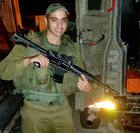
Prosecutors have requested to keep the soldier in custody while they conduct further investigations; the UN's special envoy to the region has condemned 'a gruesome, immoral and unjust act'.
The IDF soldier who shot dead a neutralized terrorist after a stabbing attack in Hebron is being investigated on suspicion of murder, it was revealed in a court hearing on Friday.
The Palestinian attacker, Abed al Fatah a-Sharif, along with another attacker, stabbed an IDF soldier. Both were then gunned down by other soldiers.
A video filmed by a B'Tselem volunteer several minutes later shows the wounded a-Sharif lying on the ground motionless as an IDF soldier aims his weapon at him and shoots him in the head.
The IDF suspended and then arrested the soldier, and the military’s Criminal Investigation Division (CID) has already launched an investigation into the incident.
The soldier’s lawyer said his client saw a-Sharif moving and fearing he was going to detonate a bomb, leading him to shoot the neutralized attacker. A second video from the incident shows the terrorist moving before being shot.
A third video of the evacuation of the wounded soldier reveals dialogue between the rescue team members and the soldiers around them, with an authoritative figure saying, "He probably has an explosive on him, pay attention. Until the bomb squad comes, nobody touches him."
During a remand extension hearing on Friday, the CID asked to keep the soldier under arrest, citing concerns that he might obstruct justice or would flee.
The prosecutor commented on the impending complexity of the circumstances, "There's suspicion of a serious crime that will require us to conduct multiple investigations. There are different recordings of the event and different testimonies gathered." According to the prosecutor, the soldier claims to have shot out of fear for his life.
During its investigation, the CID learned that before shooting the attacker, the soldier shouted "Be careful, move away!" to his fellow soldiers. This would support his claim that he feared the attacker was about to detonate a bomb.
What also supports the soldier's claim is the attacker's choice of warm clothing on a day the weather was in the high 20's Celsius (77-84 degrees Fahrenheit). "The terrorist was wearing a coat or a sweater, and we're well aware of the weather yesterday," a CID representative said.
Furthermore, the CID noted that one of the videos from the incident documents someone raising the concern that the terrorist might be carrying explosives.
The CID also noted that the first video of the incident, released by the B'Tselem NGO, was edited, and that it was able to get a fuller picture of the incident with the help of other videos and testimony from many who were present at the scene.
The soldier, the CID said, completely cooperated with interrogators. He told them he did not sleep on the night before the incident.
The soldier's lawyer Ilan Katz argued, "The murder suspicion is farfetched and there is no direct or indirect evidence to establish this suspicion."
Katz further asserted that the soldier conducted himself "according to the rules of engagement that he received."
'Apparent extrajudicial execution'
The United Nations’ special envoy to the Middle East condemned on Friday what he called "the apparent extrajudicial execution of a Palestinian assailant” by an IDF soldier in Hebron the day before.
"This was a gruesome, immoral and unjust act that can only fuel more violence and escalate an already volatile situation," Nickolay Mladenov said.
Mladenov welcomed Defense Minister Moshe Ya'alon’s condemnation and called on Israeli authorities to “swiftly bring to justice the perpetrator who has already been detained.”
The incident was immediately denounced as an "execution" by human rights activists and as a "war crime" by the Palestinians. Prime Minister Benjamin Netanyahu also condemned the incident.
Minister of Education Naftali Bennet posted a message on Facebook regarding the incident, saying, "Has anyone heard the soldier? The entire state leadership quickly piled onto the soldier. One Knesset member even said the soldier was 'restrained.' Were you there? Did you understand his thinking? The considerations?
Perhaps there was a fear that he was rigged with explosives? That he'd explode onto the soldiers and civilians? Did you ask the soldier before condemning him? Were the terrorist rigged to explode, the soldier would have been seen as a national hero; could any of you, in his shoes, have known what the situation was really like?"
The videographer was surprised
Imad Abu Shamsia, the Palestinian B'Tselem volunteer who documented the incident, Told Ynet that "I never though that your Israeli soldiers would execute a Palestinian, let alone one who was wounded, lying on the ground, and not posing any danger." Abu Shamsia was at his home in Hebron when that attack in which the two terrorists stabbed an IDF soldier occurred. "I live just ten meters from the place, I heard shots and immediately came outside with the camera. I saw a shot man lying on the ground, but he was moving and still alive, wallowing in his blood. I didn't know at that stage whether he was an Israeli or a Palestinian."
Abu Shamsia said that a few seconds later he saw that there was another man in civilian clothing, and a wounded IDF soldier, which led him to conclude that the two civilians were Palestinian.
"Afterwards, they sent me away from the place and told me I filming was forbidden, so I relocated to another spot, further away, and started filming again. Suddenly I heard one of the soldiers loading his weapon, and then I saw him fire a single bullet at the guy who was lying on the ground. It surprised me, since the Palestinian was alive. He tried to move. But it was just a slight movement. He was wounded and couldn't get up. He wasn't a danger to the settlers or the soldiers who were there."
Abu Shamsia said that he was surprised by the fact that his video made such a stir in Israel and internationally, admitting that even he did not understand the full meaning of the unusual footage at first. He later received calls from all over the world, including the office of Palestinian President Mahmoud Abbas. Abu Shamsia stated that he hopes "The Palestinian leadership will use this documentation in the International Criminal Court in The Hague."
Prime Minister Netanyahu gave a short statement on the matter, saying, "What happened in Hebron does not represent the values of the IDF. The IDF expects its soldiers to act cool-headedly and in accordance with the standing orders regarding opening fire."
The IDF soldier who shot dead a neutralized terrorist after a stabbing attack in Hebron is being investigated on suspicion of murder, it was revealed in a court hearing on Friday.
The Palestinian attacker, Abed al Fatah a-Sharif, along with another attacker, stabbed an IDF soldier. Both were then gunned down by other soldiers.
A video filmed by a B'Tselem volunteer several minutes later shows the wounded a-Sharif lying on the ground motionless as an IDF soldier aims his weapon at him and shoots him in the head.
The IDF suspended and then arrested the soldier, and the military’s Criminal Investigation Division (CID) has already launched an investigation into the incident.
The soldier’s lawyer said his client saw a-Sharif moving and fearing he was going to detonate a bomb, leading him to shoot the neutralized attacker. A second video from the incident shows the terrorist moving before being shot.
A third video of the evacuation of the wounded soldier reveals dialogue between the rescue team members and the soldiers around them, with an authoritative figure saying, "He probably has an explosive on him, pay attention. Until the bomb squad comes, nobody touches him."
During a remand extension hearing on Friday, the CID asked to keep the soldier under arrest, citing concerns that he might obstruct justice or would flee.
The prosecutor commented on the impending complexity of the circumstances, "There's suspicion of a serious crime that will require us to conduct multiple investigations. There are different recordings of the event and different testimonies gathered." According to the prosecutor, the soldier claims to have shot out of fear for his life.
During its investigation, the CID learned that before shooting the attacker, the soldier shouted "Be careful, move away!" to his fellow soldiers. This would support his claim that he feared the attacker was about to detonate a bomb.
What also supports the soldier's claim is the attacker's choice of warm clothing on a day the weather was in the high 20's Celsius (77-84 degrees Fahrenheit). "The terrorist was wearing a coat or a sweater, and we're well aware of the weather yesterday," a CID representative said.
Furthermore, the CID noted that one of the videos from the incident documents someone raising the concern that the terrorist might be carrying explosives.
The CID also noted that the first video of the incident, released by the B'Tselem NGO, was edited, and that it was able to get a fuller picture of the incident with the help of other videos and testimony from many who were present at the scene.
The soldier, the CID said, completely cooperated with interrogators. He told them he did not sleep on the night before the incident.
The soldier's lawyer Ilan Katz argued, "The murder suspicion is farfetched and there is no direct or indirect evidence to establish this suspicion."
Katz further asserted that the soldier conducted himself "according to the rules of engagement that he received."
'Apparent extrajudicial execution'
The United Nations’ special envoy to the Middle East condemned on Friday what he called "the apparent extrajudicial execution of a Palestinian assailant” by an IDF soldier in Hebron the day before.
"This was a gruesome, immoral and unjust act that can only fuel more violence and escalate an already volatile situation," Nickolay Mladenov said.
Mladenov welcomed Defense Minister Moshe Ya'alon’s condemnation and called on Israeli authorities to “swiftly bring to justice the perpetrator who has already been detained.”
The incident was immediately denounced as an "execution" by human rights activists and as a "war crime" by the Palestinians. Prime Minister Benjamin Netanyahu also condemned the incident.
Minister of Education Naftali Bennet posted a message on Facebook regarding the incident, saying, "Has anyone heard the soldier? The entire state leadership quickly piled onto the soldier. One Knesset member even said the soldier was 'restrained.' Were you there? Did you understand his thinking? The considerations?
Perhaps there was a fear that he was rigged with explosives? That he'd explode onto the soldiers and civilians? Did you ask the soldier before condemning him? Were the terrorist rigged to explode, the soldier would have been seen as a national hero; could any of you, in his shoes, have known what the situation was really like?"
The videographer was surprised
Imad Abu Shamsia, the Palestinian B'Tselem volunteer who documented the incident, Told Ynet that "I never though that your Israeli soldiers would execute a Palestinian, let alone one who was wounded, lying on the ground, and not posing any danger." Abu Shamsia was at his home in Hebron when that attack in which the two terrorists stabbed an IDF soldier occurred. "I live just ten meters from the place, I heard shots and immediately came outside with the camera. I saw a shot man lying on the ground, but he was moving and still alive, wallowing in his blood. I didn't know at that stage whether he was an Israeli or a Palestinian."
Abu Shamsia said that a few seconds later he saw that there was another man in civilian clothing, and a wounded IDF soldier, which led him to conclude that the two civilians were Palestinian.
"Afterwards, they sent me away from the place and told me I filming was forbidden, so I relocated to another spot, further away, and started filming again. Suddenly I heard one of the soldiers loading his weapon, and then I saw him fire a single bullet at the guy who was lying on the ground. It surprised me, since the Palestinian was alive. He tried to move. But it was just a slight movement. He was wounded and couldn't get up. He wasn't a danger to the settlers or the soldiers who were there."
Abu Shamsia said that he was surprised by the fact that his video made such a stir in Israel and internationally, admitting that even he did not understand the full meaning of the unusual footage at first. He later received calls from all over the world, including the office of Palestinian President Mahmoud Abbas. Abu Shamsia stated that he hopes "The Palestinian leadership will use this documentation in the International Criminal Court in The Hague."
Prime Minister Netanyahu gave a short statement on the matter, saying, "What happened in Hebron does not represent the values of the IDF. The IDF expects its soldiers to act cool-headedly and in accordance with the standing orders regarding opening fire."
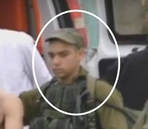
Soldier claims terrorist moved, leading him to fear he was about to detonate a bomb; military's Criminal Investigation Division to also examine whether troops operated according to procedures as no one checked the terrorist for explosives, nor did he receive medical treatment.
The IDF's Criminal Investigation Division (CID) will question the two military officers who were at the scene of the incident in which a soldier shot a neutralized terrorist in Hebron on Thursday.
The terrorist, Abed al Fatah a-Sharif, along with another attacker, stabbed an IDF soldier and then both were gunned down by other soldiers.
A video filmed by a B'Tselem volunteer several minutes later shows a-Sharif lying on the ground motionless as an IDF soldier aims his weapon at him and shoots him in the head.
In addition to the soldier, who was suspended and could face criminal charges, commanders in the battalion could also face disciplinary action.
Friends and family of the soldier are worried that the IDF, fearing wide scale international condemnation, will make the soldier into a scapegoat and hand out "disproportional" punishments to him and the junior commanders involved.
The soldier's line of defense, which is also supported by a new video that emerged from the incident, is that a-Sharif moved before being shot, which led the soldier to fear he would detonate a bomb. This fear later turned out to be unfounded as no explosives were found on a-Sharif.
The soldier's family came out in his defense, saying he's an "excellent fighter and an army medic."
The soldier's lawyer, Benjamin Malka, said: "You can clearly see in the video that the terrorist moves, and that the terrorist is wearing a coat that could conceal an explosive vest and other explosives underneath."
He went on to say that "This is a process that is at its start. Things have yet to be examined in depth and I am saddened to see that a public trial had been held before the suspect has been given the right to defend his innocence."
The IDF is frustrated by the incident, which is why the CID was quick to arrest the fighter.
In addition to the question of the legality of the shooting, the CID is looking into suspicions that the troops at the scene were not operating according to procedures. In cases of an incident with wounded on both sides, the first to be treated are those more seriously wounded - but the medical team cannot start treating the terrorist before the troops ensure he is not carrying explosives.
After the attack in Hebron, the terrorist did not receive medical treatment after being shot down, but the soldiers didn't check him for explosives either. He was lying on the ground with gunshot wounds for several minutes without anyone having approached him to treat him or check for explosive, while two civilian ambulances were nearby.
The IDF's Criminal Investigation Division (CID) will question the two military officers who were at the scene of the incident in which a soldier shot a neutralized terrorist in Hebron on Thursday.
The terrorist, Abed al Fatah a-Sharif, along with another attacker, stabbed an IDF soldier and then both were gunned down by other soldiers.
A video filmed by a B'Tselem volunteer several minutes later shows a-Sharif lying on the ground motionless as an IDF soldier aims his weapon at him and shoots him in the head.
In addition to the soldier, who was suspended and could face criminal charges, commanders in the battalion could also face disciplinary action.
Friends and family of the soldier are worried that the IDF, fearing wide scale international condemnation, will make the soldier into a scapegoat and hand out "disproportional" punishments to him and the junior commanders involved.
The soldier's line of defense, which is also supported by a new video that emerged from the incident, is that a-Sharif moved before being shot, which led the soldier to fear he would detonate a bomb. This fear later turned out to be unfounded as no explosives were found on a-Sharif.
The soldier's family came out in his defense, saying he's an "excellent fighter and an army medic."
The soldier's lawyer, Benjamin Malka, said: "You can clearly see in the video that the terrorist moves, and that the terrorist is wearing a coat that could conceal an explosive vest and other explosives underneath."
He went on to say that "This is a process that is at its start. Things have yet to be examined in depth and I am saddened to see that a public trial had been held before the suspect has been given the right to defend his innocence."
The IDF is frustrated by the incident, which is why the CID was quick to arrest the fighter.
In addition to the question of the legality of the shooting, the CID is looking into suspicions that the troops at the scene were not operating according to procedures. In cases of an incident with wounded on both sides, the first to be treated are those more seriously wounded - but the medical team cannot start treating the terrorist before the troops ensure he is not carrying explosives.
After the attack in Hebron, the terrorist did not receive medical treatment after being shot down, but the soldiers didn't check him for explosives either. He was lying on the ground with gunshot wounds for several minutes without anyone having approached him to treat him or check for explosive, while two civilian ambulances were nearby.
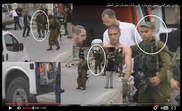
A UN official on Friday condemned in the strongest terms the brutal "extrajudicial execution" of a wounded Palestinian by an Israeli soldier that was captured on camera in Hebron the day before.
Special Coordinator for the Middle East Peace Process Nickolay Mladenov said he strongly condemned the apparent "extrajudicial execution" of the Palestinian, who was shot in the head at point-blank range despite having already been shot to the ground, where he lay wounded for several minutes, after allegedly stabbing an Israeli soldier.
"This was a gruesome, immoral, and unjust act that can only fuel more violence and escalate an already volatile situation," Mladenov said.
He welcomed the condemnation of the execution by Israel’s Minister of Defense, Moshe Yaalon, and called on the Israeli authorities to "swiftly bring to justice" the Israeli soldier responsible.
The UN official went on: "It is time to stop the negative spiral of violence and to begin positive steps towards ending the occupation and bringing long overdue peace and security to the people of Israel and Palestine."
Israel has repeatedly been accused by rights groups, international leaders, and Palestinian officials of enacting a policy of "extrajudicial executions" against Palestinians since a wave of unrest swept the occupied Palestinian territory and Israel last October.
However, the rare video footage of Thursday's incident -- captured by a staff member with Israeli human rights group B’Tselem -- brought a barrage of condemnations from the Israeli leadership and led Israel's army to detain the soldier responsible and launch an investigation.
Palestinian residents of Hebron Abed al-Fattah Yusri al-Sharif and Ramzi Aziz al-Qasrawi, both 21 years old, were shot down Thursday after allegedly stabbing and moderately wounding an Israeli soldier near a military checkpoint in Hebron’s Old City.
Al-Qasrawi was killed instantly, while the graphic video footage showed al-Sharif lying on the ground for several minutes -- moving his head slightly but posing no threat -- before an Israeli soldier walked up to him and shot him in the head.
The soldier has since claimed he killed al-Sharif out of fear the incapacitated man was going to detonate a suicide bomb vest, according to Israeli media reports.
Israeli Prime Minister Benjamin Netanyahu said in response the soldier's conduct did not represent the values of the Israeli army, which he said "expects its soldiers to behave level-headedly and in accordance with the rules of engagement."
Defense Minister Yaalon for his part said: "Even as we are forced to fight our enemies and overcome them in battle, we are equally obligated to uphold our mores. To be human."
The statements come despite the fact that both officials have been accused by Palestinians and rights groups of incitement against Palestinians and advocating a "shoot-to-kill" policy against Palestinians who carry out attacks.
Palestinian member of Knesset Ayman Odeh, who has been a vocal opponent of past incitement, said: "Israel has become a place where public executions are carried out with the cheers of the crowd, the price of security and moral deterioration is being paid by both peoples."
The MK called for Netanyahu to be tried with the soldier responsible for Thursday's execution, alongside other Israeli officials responsible for incitement against Palestinians.
Special Coordinator for the Middle East Peace Process Nickolay Mladenov said he strongly condemned the apparent "extrajudicial execution" of the Palestinian, who was shot in the head at point-blank range despite having already been shot to the ground, where he lay wounded for several minutes, after allegedly stabbing an Israeli soldier.
"This was a gruesome, immoral, and unjust act that can only fuel more violence and escalate an already volatile situation," Mladenov said.
He welcomed the condemnation of the execution by Israel’s Minister of Defense, Moshe Yaalon, and called on the Israeli authorities to "swiftly bring to justice" the Israeli soldier responsible.
The UN official went on: "It is time to stop the negative spiral of violence and to begin positive steps towards ending the occupation and bringing long overdue peace and security to the people of Israel and Palestine."
Israel has repeatedly been accused by rights groups, international leaders, and Palestinian officials of enacting a policy of "extrajudicial executions" against Palestinians since a wave of unrest swept the occupied Palestinian territory and Israel last October.
However, the rare video footage of Thursday's incident -- captured by a staff member with Israeli human rights group B’Tselem -- brought a barrage of condemnations from the Israeli leadership and led Israel's army to detain the soldier responsible and launch an investigation.
Palestinian residents of Hebron Abed al-Fattah Yusri al-Sharif and Ramzi Aziz al-Qasrawi, both 21 years old, were shot down Thursday after allegedly stabbing and moderately wounding an Israeli soldier near a military checkpoint in Hebron’s Old City.
Al-Qasrawi was killed instantly, while the graphic video footage showed al-Sharif lying on the ground for several minutes -- moving his head slightly but posing no threat -- before an Israeli soldier walked up to him and shot him in the head.
The soldier has since claimed he killed al-Sharif out of fear the incapacitated man was going to detonate a suicide bomb vest, according to Israeli media reports.
Israeli Prime Minister Benjamin Netanyahu said in response the soldier's conduct did not represent the values of the Israeli army, which he said "expects its soldiers to behave level-headedly and in accordance with the rules of engagement."
Defense Minister Yaalon for his part said: "Even as we are forced to fight our enemies and overcome them in battle, we are equally obligated to uphold our mores. To be human."
The statements come despite the fact that both officials have been accused by Palestinians and rights groups of incitement against Palestinians and advocating a "shoot-to-kill" policy against Palestinians who carry out attacks.
Palestinian member of Knesset Ayman Odeh, who has been a vocal opponent of past incitement, said: "Israel has become a place where public executions are carried out with the cheers of the crowd, the price of security and moral deterioration is being paid by both peoples."
The MK called for Netanyahu to be tried with the soldier responsible for Thursday's execution, alongside other Israeli officials responsible for incitement against Palestinians.
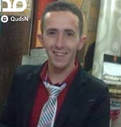
Nicholai Mladinov, the United Nations Special Coordinator for Middle East Peace Process, denounced earlier on Friday the Israeli military execution of a young Palestinian man, after the soldiers already shot and seriously wounded him, in the southern West Bank city of Hebron.
Mladinov said the conduct of the Israeli army constitutes an extra-judicial execution, especially since the slain Palestinian, Abdul-Fattah Sharif, 21, was already incapacitated due to his very serious injury, when the soldier decided to shoot him in the head.
The execution was caught on tape by Emad Abu Shamsiyya, a resident of Tal Romeida neighborhood of Hebron city, and was published by the Israeli Information Center for Human Rights in the Occupied Territories (B’Tselem).
"I strongly condemn the extra-judicial execution of the young Palestinian man in Hebron." Mladinov said in a statement released by his office, "This is an immoral crime, an act that will just lead to further violence and escalation in the already volatile region."
He called on Israel to conduct a serious investigation into the crime, and prosecute the murderer, and added that “the time has come to end this cycle of violence, and initiate positive steps that would lead to ending the Israeli occupation, and achieving the long-awaited peace.”
On Thursday at night, Mladinov said during a Security Council meeting to discuss the situation in the Middle East, that world leaders and countries must provide the positive atmosphere for the resumption of direct Palestinian-Israeli peace talks, and end the deadly escalation.
"Israel needs to understand that building more walls, restrictions on movement, collective punishment and the destruction of property, will just lead to more anger and more violence," he added, "The people are angered by the ongoing humiliation, discrimination and collective punishment."
Mladinov said the conduct of the Israeli army constitutes an extra-judicial execution, especially since the slain Palestinian, Abdul-Fattah Sharif, 21, was already incapacitated due to his very serious injury, when the soldier decided to shoot him in the head.
The execution was caught on tape by Emad Abu Shamsiyya, a resident of Tal Romeida neighborhood of Hebron city, and was published by the Israeli Information Center for Human Rights in the Occupied Territories (B’Tselem).
"I strongly condemn the extra-judicial execution of the young Palestinian man in Hebron." Mladinov said in a statement released by his office, "This is an immoral crime, an act that will just lead to further violence and escalation in the already volatile region."
He called on Israel to conduct a serious investigation into the crime, and prosecute the murderer, and added that “the time has come to end this cycle of violence, and initiate positive steps that would lead to ending the Israeli occupation, and achieving the long-awaited peace.”
On Thursday at night, Mladinov said during a Security Council meeting to discuss the situation in the Middle East, that world leaders and countries must provide the positive atmosphere for the resumption of direct Palestinian-Israeli peace talks, and end the deadly escalation.
"Israel needs to understand that building more walls, restrictions on movement, collective punishment and the destruction of property, will just lead to more anger and more violence," he added, "The people are angered by the ongoing humiliation, discrimination and collective punishment."
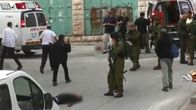
'What happened in Hebron does not represent the values of the Israel Defense Forces,' Netanyahu says in reaction to the incident. The soldier has since been arrested.
Israeli politicians from across the aisle condemned on Thursday an Israeli soldier who shot a subdued Palestinian attacker in the head in Hebron.
In a video provided by a B'Tselem fieldworker the same day, the wounded Palestinian, who had earlier carried out a stabbing attack, is seen lying on the ground when the soldier shoots him in the head.
"What happened in Hebron does not represent the values of the Israel Defense Forces," Prime Minister Benjamin Netanyahu said in reaction to the incident, adding that the IDF "expects its soldiers to act coolly and in accordance with the rules of engagement."
“Even when our blood is boiling, we must not allow such a loss of sense, such a loss of control,” Defense Minister Moshe Ya’alon (Likud) said in a press statement, adding that "terror must be fought uncompromisingly, he stressed, “but even so, woe to us if we act contrary to our moral values and our conscience.”
Ya'alon continued that Israel has a “moral obligation” to “preserve its humanity,” “remember the limits of power” and “keep ourselves from immoral behavior.”
MK Ofer Shelah of Yesh Atid said, “The terrorists’ murderous despicableness isn’t a reason for the IDF to discard its values. We should laud the army’s swift action in opening an investigation and making clear that this act contradicts its values ... Morality is the source of the army’s strength, and abandoning even a little of it due to the difficulties caused by terror would undermine national security.”
Meretz chairwoman Zehava Galon said the incident “should greatly concern the heads of the defense establishment and the government.” The soldier must stand trial, she said, “but in addition, it’s impossible to close our eyes to the public atmosphere created by elected officials in the coalition and the government, deliberately and irresponsibly, which is penetrating every segment of our society and corrupting it.” The government’s “unbridled incitement ... also reaches soldiers in the field and sends them an immoral and dangerous message,” she added.
Joint Arab List chairman Ayman Odeh said, “In recent months, Israel has become a place where public executions are carried out to the public applause ... Its ministers have repeatedly urged the public to execute every suspicious person. The price of the security and moral deterioration is being paid by both peoples, Israeli and Palestinian.”
Both he and Joint Arab List MK Ahmad Tibi demanded that inciting politicians, including Netanyahu, stand trial along with the soldier.
Earlier, IDF Spokesperson Moti Almoz told reporters that the soldier had been arrested and was being investigated by the Military Police. He added that Chief of Staff Gadi Eisenkot spoke personally with the head of Central Command about the incident and ordered a thorough investigation, “in order to understand what happened that a solder decided to open fire at a terrorist when he was lying down.”
Israeli politicians from across the aisle condemned on Thursday an Israeli soldier who shot a subdued Palestinian attacker in the head in Hebron.
In a video provided by a B'Tselem fieldworker the same day, the wounded Palestinian, who had earlier carried out a stabbing attack, is seen lying on the ground when the soldier shoots him in the head.
"What happened in Hebron does not represent the values of the Israel Defense Forces," Prime Minister Benjamin Netanyahu said in reaction to the incident, adding that the IDF "expects its soldiers to act coolly and in accordance with the rules of engagement."
“Even when our blood is boiling, we must not allow such a loss of sense, such a loss of control,” Defense Minister Moshe Ya’alon (Likud) said in a press statement, adding that "terror must be fought uncompromisingly, he stressed, “but even so, woe to us if we act contrary to our moral values and our conscience.”
Ya'alon continued that Israel has a “moral obligation” to “preserve its humanity,” “remember the limits of power” and “keep ourselves from immoral behavior.”
MK Ofer Shelah of Yesh Atid said, “The terrorists’ murderous despicableness isn’t a reason for the IDF to discard its values. We should laud the army’s swift action in opening an investigation and making clear that this act contradicts its values ... Morality is the source of the army’s strength, and abandoning even a little of it due to the difficulties caused by terror would undermine national security.”
Meretz chairwoman Zehava Galon said the incident “should greatly concern the heads of the defense establishment and the government.” The soldier must stand trial, she said, “but in addition, it’s impossible to close our eyes to the public atmosphere created by elected officials in the coalition and the government, deliberately and irresponsibly, which is penetrating every segment of our society and corrupting it.” The government’s “unbridled incitement ... also reaches soldiers in the field and sends them an immoral and dangerous message,” she added.
Joint Arab List chairman Ayman Odeh said, “In recent months, Israel has become a place where public executions are carried out to the public applause ... Its ministers have repeatedly urged the public to execute every suspicious person. The price of the security and moral deterioration is being paid by both peoples, Israeli and Palestinian.”
Both he and Joint Arab List MK Ahmad Tibi demanded that inciting politicians, including Netanyahu, stand trial along with the soldier.
Earlier, IDF Spokesperson Moti Almoz told reporters that the soldier had been arrested and was being investigated by the Military Police. He added that Chief of Staff Gadi Eisenkot spoke personally with the head of Central Command about the incident and ordered a thorough investigation, “in order to understand what happened that a solder decided to open fire at a terrorist when he was lying down.”
